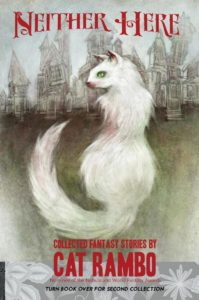
So here’s a slew of classic science fiction novels, available free online on Project Gutenberg. (Kindle users, it’s so so easy to mail files onto your Kindle, although it’s not free when you’re moving books on there, but costs a .15 per MB, with a book running 2-4 MB, depending.)
- Flatland by Edwin Abbot. The story of life in two dimensions, written in 1884 by an English schoolmaster, it originally boasted “A Square” as author.
- A Princess of Mars by Edgar Rice Burroughs. One of the great pulp writers, Burroughs’ work is well represented on Project Gutenberg, and provides a taste of old school sf at its best. including the Mars, Pellucidar, and Tarzan series.
- R.U.R. by Karel Capek. This Czechoslovakian play first was staged in 1921. It deals with the rise of the robots, and their final rebellion against the humans.
- Herland by Charlotte Perkins Gilman. Written by one of the early suffrage leaders, Gilman posits a society without men, and in the tradition of such utopian fiction, explains it at length.
- Deathworld by Harry Harrison. The first of the Deathworld series, this deals with gambler Jason dinAlt and his visit to the deadliest planet in the universe.
- Beyond Lies the Wub by Philip K. Dick. No one can be a science fiction fan without at least a little Philip K. Dick in their reading background (in my opinion). Prolific, full of wild imagination, and talented, he produced novels and short stories that are a major influence on the field. Others to read by Dick: Valis, Ubik), Flow My Tears, the Policeman Said, and (always) Do Androids Dream of Electric Sheep (which inspired the movie Bladerunner). I’m happy to see so many P.K. Dick novels available on the Kindle, but I miss Eye in the Sky and The Man in the High Castle.
- Time Traders by Andre Norton. Norton brought countless readers to f&sf through her YA novels. Time Traders is the first of a series and follows sharp-jawed, keen-eyed Ross Murdock in his quest for lost alien technology.
- Galaxy Primes by E.E. Smith. Another of the Golden Age writers, Smith does space opera like no one else. Here two men and two men are lost in space and must somehow chart their way back to their home planet, Earth.
- Invisible Man by H.G. Wells. There’s a lot of Wells to pick from, but this is one of my favorites, and certainly has inspired plenty of other works, both books and movies. I’ll note that you should read Ralph Ellison’s version first – while not strictly sf, it’s surreal and enlightening and a great take on the idea.
And the tenth? I’m leaving it up to you to supply, dear readers – what would you suggest, what have you found online that delighted or amazed you?
(Coming tomorrow: story prompt!!)




 Here’s something from the current piece. For fellow West Seattleites, the coffee shop in question is indeed the Admiral Bird. This is a sequel to “The Wizards of West Seattle,” which is available in
Here’s something from the current piece. For fellow West Seattleites, the coffee shop in question is indeed the Admiral Bird. This is a sequel to “The Wizards of West Seattle,” which is available in 




3 Responses
How about Little Fuzzy by H. Beam Piper. It’s a free download at ManyBooks.net.
http://manybooks.net/titles/piperh1813718137.html
I LOVE Little Fuzzy! Thanks for pointing that out.
It’s just a short story, but I love, love, love Spider Robinson’s Melancholy Elephants – which is, given it’s subject ipso facto available free.
http://www.spiderrobinson.com/melancholyelephants.html